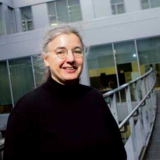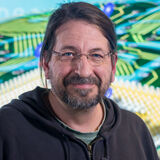Masterworks Webinar Series
Advanced Computing driven research in Health Sciences, Energy, and the Environment
Arctic Master Works Webinar and Panel Session 2
As part of an effort to promote and foster new scientific collaboration among Arctic nations, we are initiating a Master Works webinar series to highlight the impact of advanced computing in health sciences, energy, and environmental research. This webinar series brings together scientists from the U.S., Iceland and the Nordic countries to discuss compelling scientific challenges of common interest being addressed through advanced computing and to explore opportunities for collaboration. These Master Works events will feature two 30 minute presentations followed by a 30 minute panel session, total 90 min.
- Date: Wednesday December 9, 2020
- Time: 4pm GMT 10am CDT 9am MDT
- Zoom Link: MasterWorks webinar link
Presenter

Henrik Madsen - Professor, Head of Section, Dept. of Applied Mathematics and Computer Science (DTU COMPUTE), Technical University of Denmark.
Title: Digitalization for the future weather-driven low-carbon energy system
Abstract: Today energy systems are operated and planned such that the production follows the demand. However, a future low-carbon society calls for systems where demand follows the weather-driven energy production. This highlights a need for a disruption of the whole spectrum of methods ranging energy systems operation to planning. Most importantly we need methods for enabling energy flexibility at all levels of the society; examples being buildings, supermarkets, wastewater treatment plants, districts and cities. We describe a framework called the Smart-Energy Operating-System (SE-OS) for controlling the electricity load in integrated energy systems using big data analytics, AI, edge/fog/cloud computing and IoT solutions. The framework can also provide ancillary services (like congestion management, voltage and frequency control) for systems with a large penetration of wind and solar power.
 Ben
Kroposki - Director of the
Power Systems Engineering Center at the National Renewable Energy Laboratory
and IEEE Fellow, where he leads strategic research in the design, planning and
operations of electrical power systems.
Ben
Kroposki - Director of the
Power Systems Engineering Center at the National Renewable Energy Laboratory
and IEEE Fellow, where he leads strategic research in the design, planning and
operations of electrical power systems.
Title: Understanding the Challenges with Integrating Very High Levels of Wind and Solar in Electric Power Systems
Abstract: Around the world, electric utilities are setting 100% clean energy goals of which renewable technologies will be a major player. Variable renewable energy like wind and solar photovoltaics differ from conventional generation in that they use power electronic converters instead of synchronous generators to connect to electric power grids. At high levels, there are a number of technical challenges that must be addressed to ensure reliable and economic operations. We will discuss the challenges and solutions to operating power system with high levels of variable renewables and how power electronic interfaces can be used to solve some of these challenges.
Brief Introductory remarks from Torben Nielsen, Science Attache, Innovation Centre of Denmark, Danish Consulate in Boston.
Webinar Series Organizing Committee
- Morris Riedel, Associate Professor, University of Iceland
- David Martin, Industry Partnerships and Outreach Manager, Argonne National Laboratory
- Henning Úlfarsson, Assistant Professor, Reykjavik University
- Steve Hammond, Senior
Research Advisor, National Renewable Energy Laboratory
Master Works Webinar and Panel Session 1
As part of an effort to promote and foster new scientific collaboration among Arctic nations, we are initiating a Master Works webinar series to highlight advanced computing impact in health sciences, energy, and environmental research. This webinar series brings together scientists from the U.S., Iceland and the Nordic countries to discuss compelling scientific challenges of common interest being addressed through advanced computing and to explore opportunities for collaboration. These Master Works events will feature two 30 minute presentations followed by a 30 minute panel session, total 90 min.
- Date: Wednesday October 28, 2020
- Time: 3pm GMT - 10am CDT - 9am MDT
- Zoom Link: MasterWorks webinar link
Presenters
 Jacky Mallet - Assistant Professor, Computer Science, Reykjavik University. Multi-disciplinary researcher focusing on the dynamics and operation of large scale networked systems. Currently researching time series analysis with deep learning for real-time medical sleep monitoring.
Jacky Mallet - Assistant Professor, Computer Science, Reykjavik University. Multi-disciplinary researcher focusing on the dynamics and operation of large scale networked systems. Currently researching time series analysis with deep learning for real-time medical sleep monitoring.
Title: Towards Automatic Analysis of Sleep to Improve Health
Abstract: Applying A.I. and machine learning to multi-sensor inputs, offers the possibility of significantly improving detection and analysis of increasingly common conditions like sleep apnea that can cause major health issues over time if left untreated. One of the most important indicators of potential sleep apnea is pathological snoring, and in this talk we will review some of the challenges of working in this area, and the progress we have made with audio analysis of snoring and other signals as a basis for detecting apneic events. Rick Stevens – Argonne National Laboratory's Associate Laboratory Director for Computing, Environment and Life Sciences. Stevens' research focuses on three principal areas: advanced collaboration and visualization environments, high-performance computer architectures and computational problems in the life sciences.
Rick Stevens – Argonne National Laboratory's Associate Laboratory Director for Computing, Environment and Life Sciences. Stevens' research focuses on three principal areas: advanced collaboration and visualization environments, high-performance computer architectures and computational problems in the life sciences.
Presentation Title: Overview of HPC and AI Computing for COVID-19 in the US
Abstract: In this talk I'll describe some of the ongoing work in the US applying HPC and AI to COVID-19 related research. I will discuss the COVID-19 HPC consortium that joins US supercomputing centers, computing and technology vendors and federal agencies to provide HPC cycles to the SARS- CoV-2/COVID-19 research community and to streamline access to resources via a single proposal mechanism. I'll also discuss the collaboration among US DOE laboratory formed to apply advanced computing to the problem of developing molecular therapeutics for COVID-19.
Webinar Series Organizing Committee
- Morris Riedel, Associate Professor, University of Iceland
- David Martin, Industry Partnerships and Outreach Manager, Argonne National Laboratory
- Henning Úlfarsson, Assistant Professor, Reykjavik University
- Steve Hammond, Senior Research Advisor, National Renewable Energy Laboratory

